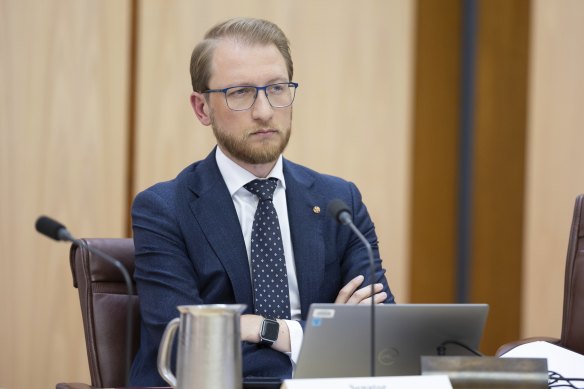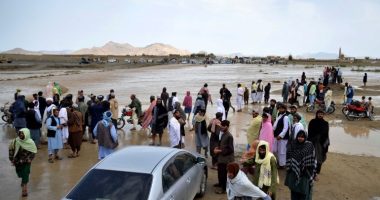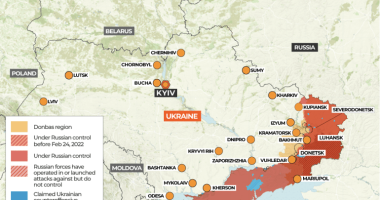The Coalition is blaming the arrival of a third boatload of foreign nationals on the West Australian coast on the Albanese government’s decision in February last year to abolish the temporary visas given to 19,000 asylum seekers already in Australia.
Both home affairs spokesman James Paterson and Nationals MP Barnaby Joyce said the decision to scrap temporary visas – only for those who arrived before Operation Sovereign Borders began in 2013 – was making Australia a more attractive destination for people smugglers.
“The abolition of that visa by this government has sent the wrong message to people smugglers and would-be asylum seekers,” Paterson told Radio National Breakfast.

Senator James Paterson. Credit: Alex Ellinghausen
“It regretfully appears to have encouraged them to get on boats again and the reason why that’s such a problem is we know last time that cost at least 1200 lives at sea.
“We don’t want to see that happen again, we don’t want to see people drowning on unseaworthy vessels on the way to Australia.”
On Seven’s Sunrise, Joyce also criticised the end of temporary visas: “Visas went and that became a flag to people overseas that the capacity to stay in Australia is becoming more likely.”
Also on Sunrise, Environment Minister Tanya Plibersek stressed that “all of the settings on Operation Sovereign Borders are the same”.
“If boats are intercepted, they’re turned back if people make it here. They’re sent to Nauru and we’ve increased the budget for Operation Sovereign Borders by about $470 million, about half a billion dollars. So of course we don’t like to see boats arrive, but these people have been dealt with immediately and that sends a strong message to people smugglers,” she said.
On Sunday, police found a man who went missing in the far northern reaches of the remote Kimberley region after being part of a group that arrived in Australia on Friday in an unknown vessel.
All of these arrivals, believed to be Chinese nationals, have been sent to Nauru
Staying with UN special rapporteur Ben Saul, who says the special adviser appointed to probe Israel’s investigation into the death of seven aid workers needs to ensure it’s robust and rigorous.
Air Chief Marshal Mark Binskin will examine Israel’s investigation of the attack in which Australian aid worker Zomi Frankcom and six of her World Central Kitchen colleagues died.
Saul told ABC Radio National this morning appointing the former chief of the Australian Defence Force as special adviser was an important step.
“Because there is of a very long history of Israel giving essentially impunity to its own forces, where allegations of violations have occurred,” he said this morning.
“I think it is really important that through this special adviser Australia, liaises with the Israeli authorities, checks that their investigation is rigorous and robust and according to national standards, and does proceed to war crimes charges, if that is appropriate.”
UN special rapporteur on Human Rights Professor Ben Saul says Israel has an obligation to refer the deaths of aid workers in an airstrike to military prosecutors.
The deadly strike last week killed Australian Zomi Frankcom and six fellow aid workers, with Israeli dismissing two army officers involved in the operation.
“They’ve got an obligation to do that if there’s a suspicion of violation of international humanitarian law or potential war crimes that have been committed,” Saul told RN Breakfast this morning.
“So I think it is really important that Australia continues to place this pressure on Israel to make sure that their preliminary investigation is carried through to full and transparent accountability.”
Foreign Minister Penny Wong has named Air Chief Marshal Mark Binskin as Australia’s special adviser on Israel’s response to the drone strikes that killed Australian aid worker Zomi Frankcom and six of her World Central Kitchen colleagues.
In a move that Australian National University international law professor described as “unprecedented in modern times”, Binskin, a former chief of the Australian Defence Force, will examine Israel’s investigation of the attack, the IDF’s procedures for responding to these incidents and the measures taken to hold those responsible to account.

Zomi Frankcom at a World Central Kitchen site in Gaza at the end of March.
Wong and Defence Minister Richard Marles have already written to Israel to express their outrage after interim findings, which found the deaths were the result of a miscalculation.
Two officers were stuff down from their roles and two were reprimanded.
“The Australian Government has been clear that we expect full accountability for these deaths. The appointment of ACM Binskin will ensure the family of Zomi Frankcom, and the Australian people can have confidence in this process,” Wong said in a statement today.
Former Labor minister Craig Emerson, who is leading the review into supermarkets code of conduct, says breaking up major chains under laws wouldn’t help consumers.
It comes as the interim review of the Food and Grocery Code of Conduct is released today, and the recommendations are designed to deliver cheaper prices to consumers and fairer prices for suppliers.
Emerson was questioned this morning about why he didn’t recommend divestiture powers in the report, which would allow the Australian Competition and Consumer Commission (ACCC) and the courts to force corporations such as Woolworths and Coles to sell assets if they grew too big and gained too much market power.
“It’s one of these frankly, populist ideas,” Emerson told ABC’s RN Breakfast this morning.
He said if a divestiture law was brought in, he said it was unclear who the stores would be sold to if the assets had to be sold-off.
“Let’s say it’s Coles who gets hit by forced divestiture [laws], they’re going to sell to Woolworths? What does that do for market concentration?
He said they could be sold to a foreign multinational, but they may not come to Australia.
“So the only options then left is to start closing stores, which would terrify their workers, but for the customers and the shoppers they’d say ‘thanks for nothing’ … I just can’t see the sense of it at all,” Emerson said.
Returning to Australia, major supermarkets could face fines that run into the billions of dollars if they fail to comply with a revamped and mandatory code of conduct designed to protect farmers and families.
An interim review of the Food and Grocery Code of Conduct, to be released today, has the country’s big four supermarket retailers and wholesalers – Woolworths, Coles, Aldi and Metcash, which supplies IGA – squarely in its sights with a series of recommendations designed to deliver cheaper prices for consumers and fairer prices at the farm gate.

Craig Emerson wants the big four supermarkets to be subject to a mandatory code of conduct and to be hit with big fines for misconduct.Credit: Marija Ercegovac
The review is being led by Craig Emerson, who was competition and small business minister in the Rudd and Gillard governments. He was tasked with undertaking the review by the Albanese government in January amid growing outcry that supermarkets were failing to pass savings on even as the prices paid by the big retailers for meat, fruit and vegetables were falling.
The federal government is under intense pressure to address cost-of-living concerns in the May budget. The interim review is being released as the Greens push new laws – which the Nationals and a handful of Liberals have backed – that would allow the Australian Competition and Consumer Commission (ACCC) and the courts to force corporations such as Woolworths and Coles to sell assets if they grow too big.
The US, Britain and Australia are set to begin talks on bringing new members into their AUKUS security pact as Washington pushes for Japan to be involved as a deterrent against China, the Financial Times reported.
The countries’ defence ministers will announce discussions on “Pillar Two” of the pact, which commits the members to jointly developing quantum computing, undersea, hypersonic, artificial intelligence and cyber technology, the newspaper reported on Saturday, citing people familiar with the situation.
They are not considering expanding the first pillar, which is designed to deliver nuclear-powered attack submarines to Australia, the FT said.

Prime Minister Anthony Albanese, US President Joe Biden and UK Prime Minister Rishi Sunak in San Diego during their AUKUS meeting last year.Credit: Alex Ellinghausen
AUKUS, formed by the three countries in 2021, is part of their efforts to push back against China’s growing power in the Indo-Pacific region. China has called the AUKUS pact dangerous and warned it could spur a regional arms race.
US President Joe Biden has sought to step up partnerships with US allies in Asia, including Japan and the Philippines, amid China’s historic military build-up and its growing territorial assertiveness.
Rahm Emanuel, the US ambassador in Tokyo, wrote in an opinion piece in the Wall Street Journal on Wednesday that Japan was “about to become the first additional Pillar II partner”.
A senior U.S. administration official told Reuters on Wednesday that some sort of announcement could be expected in the coming week about Japan’s involvement but gave no details.
Biden and Japanese Prime Minister Fumio Kishida will likely discuss expanding AUKUS to include Japan when the president hosts the prime minister in Washington on Wednesday, a source with knowledge of the talks said.
Australia, however, is wary of beginning new projects until more progress has been made on supplying Canberra with nuclear-powered submarines, said the source, who asked not to be identified because they are not authorised to speak to the media.
Reuters
Israel’s military has announced it has withdrawn its forces from the southern Gaza city of Khan Younis, wrapping up a key phase in its ground offensive against the Hamas militant group and bringing its troop presence in the territory to one of the lowest levels since the six-month war began.
But defence officials said troops were merely regrouping as the army prepares to move into Hamas’ last stronghold, Rafah.
“The war in Gaza continues, and we are far from stopping,” said the military chief, Lieutenant General Herzi Halevi.

Palestinians flee from the city of Khan Younis in southern Gaza after an Israeli ground and air offensive in late January.Credit: AP
Local broadcaster Channel 13 TV reported that Israel was preparing to begin evacuating Rafah within one week and the process could take several months.
Still, the withdrawal was a milestone as Israel and Hamas marked six months of fighting. Military officials, speaking on condition of anonymity under army policy, said a “significant force” remained in Gaza to continue targeted operations including in Khan Younis, a Hamas stronghold and hometown of the group’s leader, Yehya Sinwar.
Continue reading about this here, from AP.
Good morning, and thanks for your company.
It’s Monday, April 8. I’m Caroline Schelle and I’ll be steering our live coverage for the first half of the day.
Here’s what’s making news this morning:
- The privacy watchdog is proceeding with a complaint filed on behalf of millions of Medibank cyberattack victims, which could fast-track compensation claims.
- Serial sexual abusers, rapists and paedophiles are receiving substantial support from the National Disability Insurance Scheme to live under supervision in the community after their release from detention.
- Major supermarkets could face fines in the billions of dollars if they fail to comply with a revamped, mandatory code of conduct designed to protect farmers and families.
- Women are relying on menopause treatments that can cost $50 a month because many hormonal therapies aren’t subsidised in Australia.
- In NSW, the clean-up continues as flood ravaged communities in Sydney’s west will be offered disaster assistance after their seventh flood in 18 months.
- And in other overseas news, Republican US presidential candidate Donald Trump’s campaign said a major fundraiser in Florida raked in tens of millions of dollars as he seeks to replenish diminished coffers in his rematch against Joe Biden.
Read More: World News | Entertainment News | Celeb News
SMH










